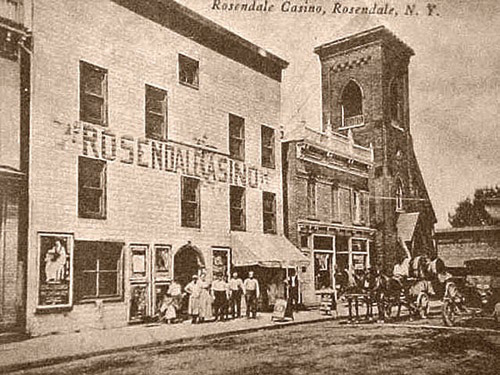Original building on the site was a blacksmith’s shop to service the town’s cement factories and the Delaware & Hudson Canal.
Building opens as the Rosendale Casino doubling as a movie theater showing 16mm films.
Theatre space used as town’s firehouse, known as Fireman’s House which also housed a basketball court. Used on Friday nights as a dance hall for square dancing.
Begins showing films full time.
Stage added to the theatre; burlesque and vaudeville performances begin
Poughkeepsie tile setter, Anthony Cacchio Sr. rents the building and converts it into a movie theatre. First film screened was the western, Blood on The Moon. Tickets were sold for 50 cents apiece for adults and 25 cents for children
Cacchio Family buys the building. Cacchio's sons, Anthony "Uncle Tony" Cacchio Jr. and Rocco "Rocky" Cacchio, worked with him at the Theatre, serving as ushers on opening night, and eventually running the Theatre. Cacchio's wife, Fannie, sold tickets to moviegoers.
Film “purist”, Anthony Cacchio Jr. bans popcorn in the Theatre because it was "too smelly, messy on the seats, and crackling paper bags disrupted quiet scenes”.
Annual theater attendance was between 40,000-50,000
Theatre founder and owner, Anthony Cacchio Sr. dies of a stroke. Grandson, Michael Cacchio introduces live performances at the theater.
Rosendale Theater “Power Broker”, Fannie Cacchio passes away in the same year that John Kerry political rally held at the theater.
Rocco Cacchio, son of the theater founder dies unexpectedly prompting the Cacchio family to consider selling the business. Local real estate developer offers to buy the theatre for $400,000.
The Cacchio family decides to sell the theatre. At the time, ticket prices are at $6 with $1 for a bag of popcorn
Rosendale Theatre Collective is born with the sole purpose of buying and preserving the theatre. Shortly afterwards, the RTC Board of Advisors is formed and includes actors Aidan Quinn, David Strathairn, Melissa Leo, Denny Dillon, Mandy Patinkin, radio personality Bruce Morrow, screenwriter Ron Nyswaner, and author Kim Wozencraft.
60 fundraisers and small campaigns including pot lucks, music benefits and an online auction take place to raise money to buy the theatre.
Rosendale Theatre Collective outpaced 362 other Pepsi Refresh entrants, to earns the 1st place $50,000 grant from the Pepsi Refresh Project.
Cacchio’s family transfer ownership of the property to the Rosendale Theatre Collective. The theatre earns 501(c) (3) nonprofit organization status.
New projector purchased. New Paltz-based Architect Rick Alfandre designed and led the collective through a phase one renovation that includes a new facade of the building and the installation of a ADA compliant wheelchair ramp and lift.
Expansion of stage and retractable screen installed.
New electric marquee replaces manual marquee that once required the movie title to be updated by changing each letter while standing on a wooden ladder.
The Rosendale Theater forced to pause during the pandemic. The Staff, Board of Directors and Volunteers rally to accomplish many upgrades including a new roof, a renovated lobby and bathroom, new carpeting and fresh paint in the theater. A new dancefloor was also created.
The Rosendale Theatre reopens for patrons to celebrate the 11th Anniversary of The Rosendale Theatre Collective.
Theatre installs a new state-of-art, energy-saving filtration and ventilation system.

In 1949 Anthony Cacchio Sr, a tile-setter, rented the building and converted it into a movie theater. The Rosendale Theatre showed about 300 different movies each year, making it unpopular with film distributors. Denied easy access to first-run films, the Theatre turned to independent movies and art films, and eventually began offering live performances.
The entire Cacchio family helped run the Theatre; wife Fannie sold tickets and selected movies, and their sons and grandson ran the projector and eventually managed the day-to-day operation of the business. Until his death in 2020, Anthony Cacchio (aka “Uncle Tony”) continued to run the projectors.
After more than 60 years of continuous operation, the Cacchio family sold the Theatre to The Rosendale Theatre Collective, a grassroots 501c3 established for the sole purpose of purchasing and preserving the Theatre. The group spent months raising funds for a down payment on the building; the bulk of its money came from small individual donations, about 60 fundraisers, a line item grant from Assemblyman Kevin Cahill, and a large grant born from a social media campaign (the Collective won the “Pepsi Refresh Project”).
The Cacchios transferred ownership of the property to the Theatre Collective on August 19, 2010. Since being purchased by the Collective, the Theatre has enjoyed many upgrades, including digital projection and a high end sound system. The façade, lobby, and seating area have all been refurbished. A wheelchair lift inside the theatre and restroom renovations make the Theatre fully ADA compliant.
The Rosendale Theatre is one of a handful of independently owned venues of its kind. It is a gem, not only in the region, but nationally and internationally.
We are offering you Teresa Torchiano’s documentary film about the Rosendale Theatre free of charge, and are happy to accept donations!
Rosendale is a small town in upstate New York with a population of 5,900. In 2009, the town’s single screen movie theatre was slated to close after 60 years in business on Main Street. The family-owned theatre was struggling to make ends meet and faced a required conversion to a new digital projection system that would put the family out of business.
The Movie House on Main Street is a documentary about the story of the Rosendale Theatre and the story of many small screen movie theaters across the United States that have closed due to an inability to sustain financially.
The Filmmakers:
Teresa Torchiano Director / Editor
Jack Davis Cinematographer
Mike Cassedy Music Composer